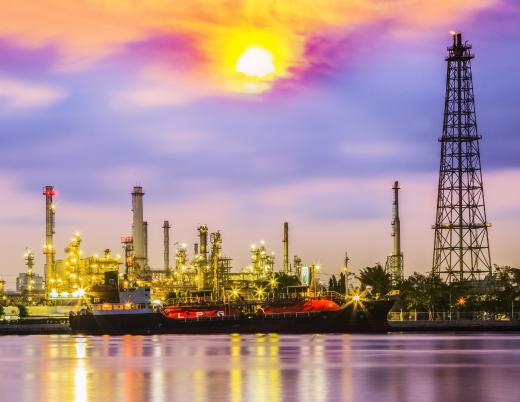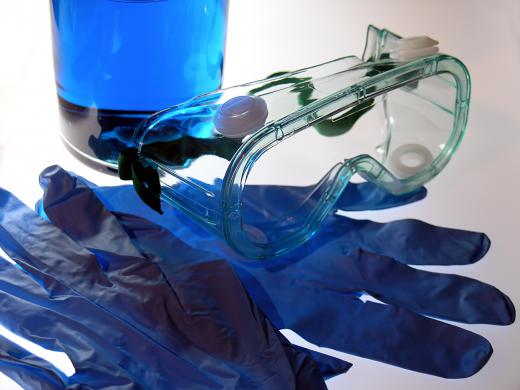What is a Chemical Plant?
 Mary McMahon
Mary McMahon
A chemical plant is an industrial facility designed for the purpose of processing and producing chemicals. Chemical plants can be found all over the world, producing a wide range of products, from photographic chemicals used in developing rooms to herbicides sprayed on commercially produced crops. Numerous specialty facilities such as wastewater treatment plants operate using methods similar to those seen at chemical plants.
At a chemical plant, the goal is to produce new chemicals, or to process chemical products. A variety of processing techniques are used, depending on what the plant manufactures, and most chemical plants make many different types of chemicals which are related to each other. A common feature of chemical plants is large vats or tanks where chemicals are processed and stored.

Many chemical plants are located in industrial areas and near shipping or rail lines so that their products can be moved easily. Safety is a major concern for facilities where chemicals are made and processed, as mistakes at a chemical plant can be very dangerous and chemical plants are vulnerable to acts of sabotage and terrorism. As a result, chemical plants are usually required to undergo regular safety inspections which confirm that the plant is operating safely, and the facilities have extensive security to protect the plant from external threats.

Chemical engineers are typically responsible for chemical plant design, developing designs which will meet the needs of the plant and provide room for growth and expansion. Chemical engineers also work in chemical plants, supervising production and managing safety programs in addition to developing new manufacturing and processing techniques. Other staff at chemical plants include security guards, technicians, and administrators who process orders and requests for chemicals.

One specialized form of chemical plant, the petrochemical plant, works exclusively with chemicals derived from oil. Petrochemical processing facilities are often located next to oil refineries for convenience, with the two facilities sharing security staffs and moving goods efficiently between the plants as needed.
Growing concerns about the environment in the late 20th century led to increasingly tough regulation of chemical plants. Facilities in the first world need to meet exacting environmental standards which are designed to prevent pollution and reduce the numbers of dangerous chemicals produced each year, and consequently, chemical manufacturing is heavily focused in developing nations where regulations are less tight. The disparity in regulations has been criticized by many environmental advocates who are concerned that developing nations may be exposing themselves to environmental hazards in their eagerness to attract business.
AS FEATURED ON:
AS FEATURED ON:














Discussion Comments
I never thought about how security at a chemical plant would change after 9/11. However, it makes a lot of sense that they would introduce stricter security due to the possibility of terrorism.
I feel like gaining access to a chemical plant would be a dream come true to some terrorists. You would have access to dangerous chemicals and a ton of information about how to make them.
Not to mention the fact that even if you aren't a terrorist, you still shouldn't be able to wander into a chemical plant. It's just not safe!
@ceilingcat - I think strict regulations are necessary too. However, you can't dispute the fact that a lot of our businesses are taking jobs overseas because they can get the job done cheaper there. Half of the reason work can be done cheaper overseas is because of less strict regulation. And obviously it is cheaper to pay a chemical plant operator in a third world country than here in the US.
In my opinion, there needs to be some kind of international treaty about this. It isn't fair for some countries to produce substances cheaply, at the expense of the environment. Not to mention the number of jobs outsourcing takes out of the United States every year. Something definitely should be done!
@kentuckycat - That is horrible! I'm going to bring that up next time I hear someone crying about "excessive government meddling in business." I know some people think the government should totally stay out of business, but I think otherwise.
It's obvious that most businesses put their profits first, above the safety of their workers and the general public. If chemical plant work wasn't regulated, all sorts of disasters would happen. I don't think it's worth sacrificing people's lives just to increase the profits of some huge corporation!
Also, in addition to the safety of individual people, we need to worry about the future of the environment also. Obviously there is a huge potential for damage to the environment by a chemical plant accident.
@jmc88 - I think probably the most high-profile chemical plant accident happened in Bhopal, India in the mid 80s. There was a plant owned by Union Carbide, which manufactured pesticides. One of the tanks holding a dangerous chemical sprung a leak, and the toxic gases spread through the city very quickly. Several thousand people died immediately from the gas, and many more were permanently disabled from it.
As I'm sure you can imagine, the safety standards in India weren't that strict at the time. The proper monitoring and safety equipment wasn't in place to even notice the leak was happening until it was too late.
Obviously, Union Carbide ended up being involved in a huge lawsuit and claimed that the leak wasn't their fault. I don't remember what the final outcome was, but they lost the case, and it was a major turning point for plant safety around the world. Now, Union Carbide is owned by Dow Chemicals, so I'd assume they're slightly more responsible.
Is anyone familiar with any major chemical plant accidents that have happened in the past? My friend and I were talking about this the other day about how much safer plants like that might be today than they were in the past. We couldn't think of any good examples, though. All I know is that I don't think I have ever heard of any leaks or anything that I recall.
The one thing we had both heard though was that people claim living next to chemical plants actually leads to higher rates of cancer and other diseases. Does anyone know if there is any proof of that happening? If the chemical plants are as regulated as people say, I can't see how anything like that could happen.
I know that in the next city over from me is one of Marathon's refineries, and I can't recall them ever having an accident as long as I've been alive, and I've certainly not heard of anyone claiming to have gotten sick for living in the city.
@jcraig - I would say there are a lot of different routes you could take for your paper. It sounds like maybe you are more interested in the safety side of things, and there are plenty of good topics there.
You never mentioned how long or detailed the paper had to be, but you could scale any of these ideas up or down. One thing you might be able to look at is just an overview of the different types of safety mechanisms that are in place. There are quite a few different ways that chemical plant equipment can be shut down in an emergency. Usually with very dangerous materials, they have a person whose main job it is to monitor the flow of materials and make sure everything looks okay.
Something else that might be more detailed is looking at some of the new safety measures that were put in place following 9/11. I know at a lot of places, they put up barricades around the plants to stop anyone from being able to drive too close. The security is also much more strict.
I don't think that I have ever seen a real chemical plant before. I have to write a paper for school on how they operate, but I can't really find much about what goes on inside of them. My paper can be pretty open-ended, and a have a few weeks to work on it. Basically, what I am wondering is what some of the chemical plant processes are and what happens behind the doors.
What sorts of chemical plant safety measures are there in place to stop the fumes and stuff from leaking out, and how do they protect the workers from breathing in the fumes?
Are there a lot of chemical plants in the United States or are most of them sent overseas because it is cheaper? Are those plants run any differently than in other places?
Post your comments